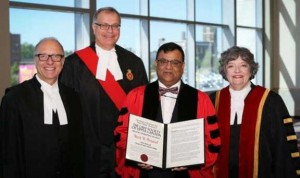
For his exemplary contributions to community development within Canada and internationally on issues of domestic and international peace, security, development, civil liberties and human rights, the Law Society of Upper Canada has bestowed on a Toronto lawyer, the degree of Doctor of Laws, honoris causa (LLD) at its Call to the Bar ceremony last Friday in London, Ontario.
Mark M. Persaud, has joined a list of distinguished judges, lawyers, and international leaders, making him the second person of Guyanese origin to have received such an honour since the Law Society started conferring the honorary degree of LLD in 1960.
Retired judge of the Ontario Court of Justice, Vibert Lampkin, is the other Guyanese who received a similar degree in 2008.
Persaud who came to Canada as a refugee in the 80s, fleeing the then political turmoil in Guyana, devoted his legal career to public service.
In his address to the 113 newly called lawyers, he said “I was completely overwhelmed when I spoke to the Treasurer about being the recipient of today’s Doctorate of Laws. Hearing the good news from a colleague whom I greatly admire and respect made it even more special.”
He told the newly called lawyers: “Don’t be afraid to be brave and tough as lawyers, but remember to always be fair and reasonable.”
Persaud recounted some of the many challenges he faced as an immgrant without status and the many volunteer roles he performed that led to his profession as a lawyer.
“I arrived alone in Canada as a youth with only $80.59 in Canadian currency and my suitcase with some personal belongings. I was not allowed to work or receive any government assistance until my immigration status was resolved, so invariably I ended up on the streets of Toronto as a homeless youth in the winter. I refused to stay at a shelter or go to soup kitchens to eat. I also did not panhandle. I was proud and desperately tried to preserve my dignity.”
He eventually ended up at the Scott Mission on a cold wintery day, fearing he would freeze to death. It was at the Mission that a retired nurse on staff (He calls her his second mother) found him a place to live.
After receiving his immigration status, Persaud said, he was offered a paid job at a refugee agency where he had volunteered.
He attended university where he studied political science and was later accepted as a student at Osgoode Law School.
His journey would continue to be rough after he was called to the Bar and was hired by the Department of Justice.
“Things did not unfold as I had anticipated. I experienced an environment in which supervisors and managers condoned racism and discrimination. I was appointed to the Deputy Minister’s Advisory Committee on Visible Minorities and took my responsibilities seriously. I spoke out against discriminatory practises in promotions and advancement and paid a heavy price personally and professionally,” said Dr. Persaud.
He told the newly called lawyers that as members of the legal profession, in a diverse society, “we have a very special obligation to expose and address all forms of discrimination.”
He also said that they should not be afraid “to call a spade a spade. We should not be reluctant to be constructively critical. We all have an important obligation to contribute to the eradication of unfairness and discrimination especially in our profession.”


